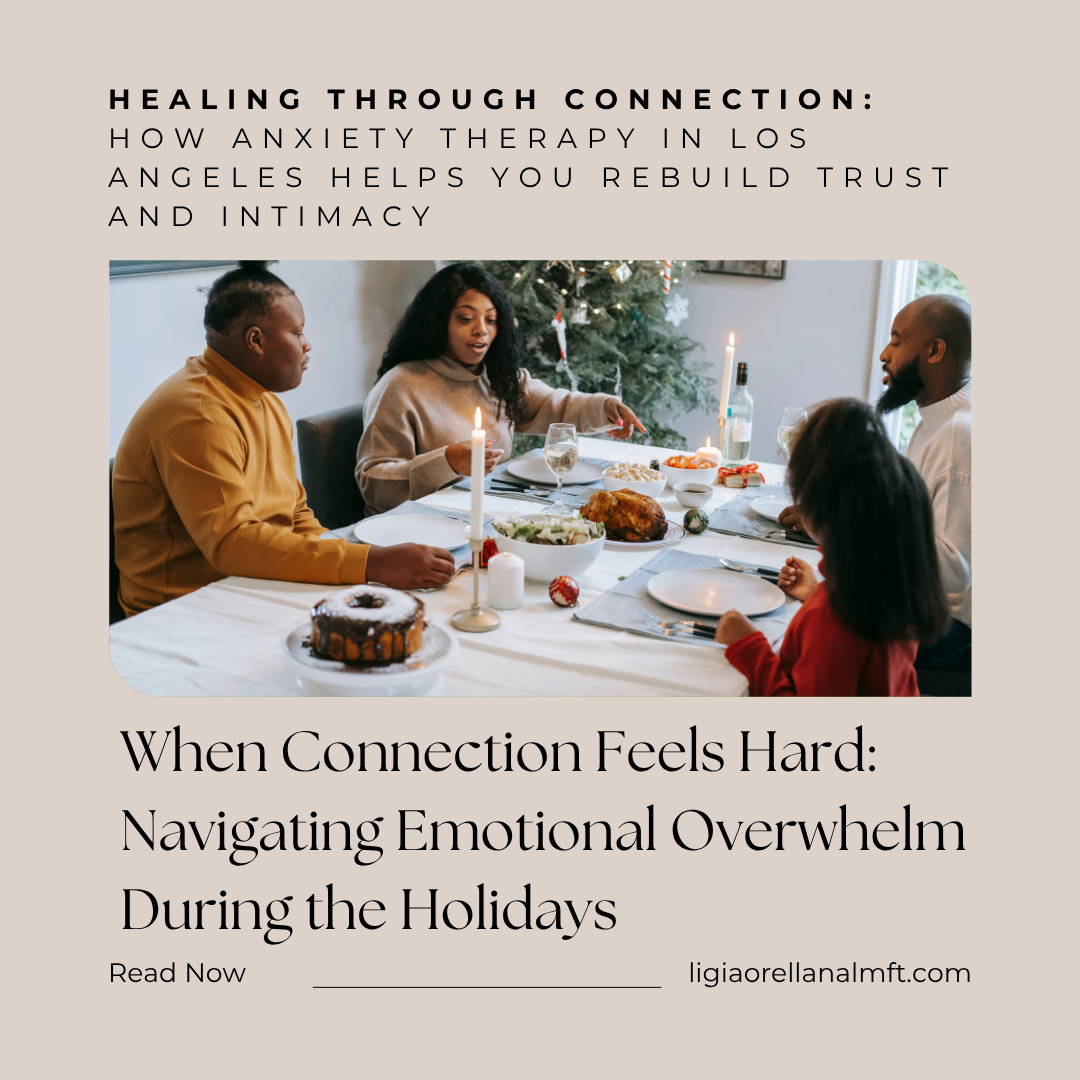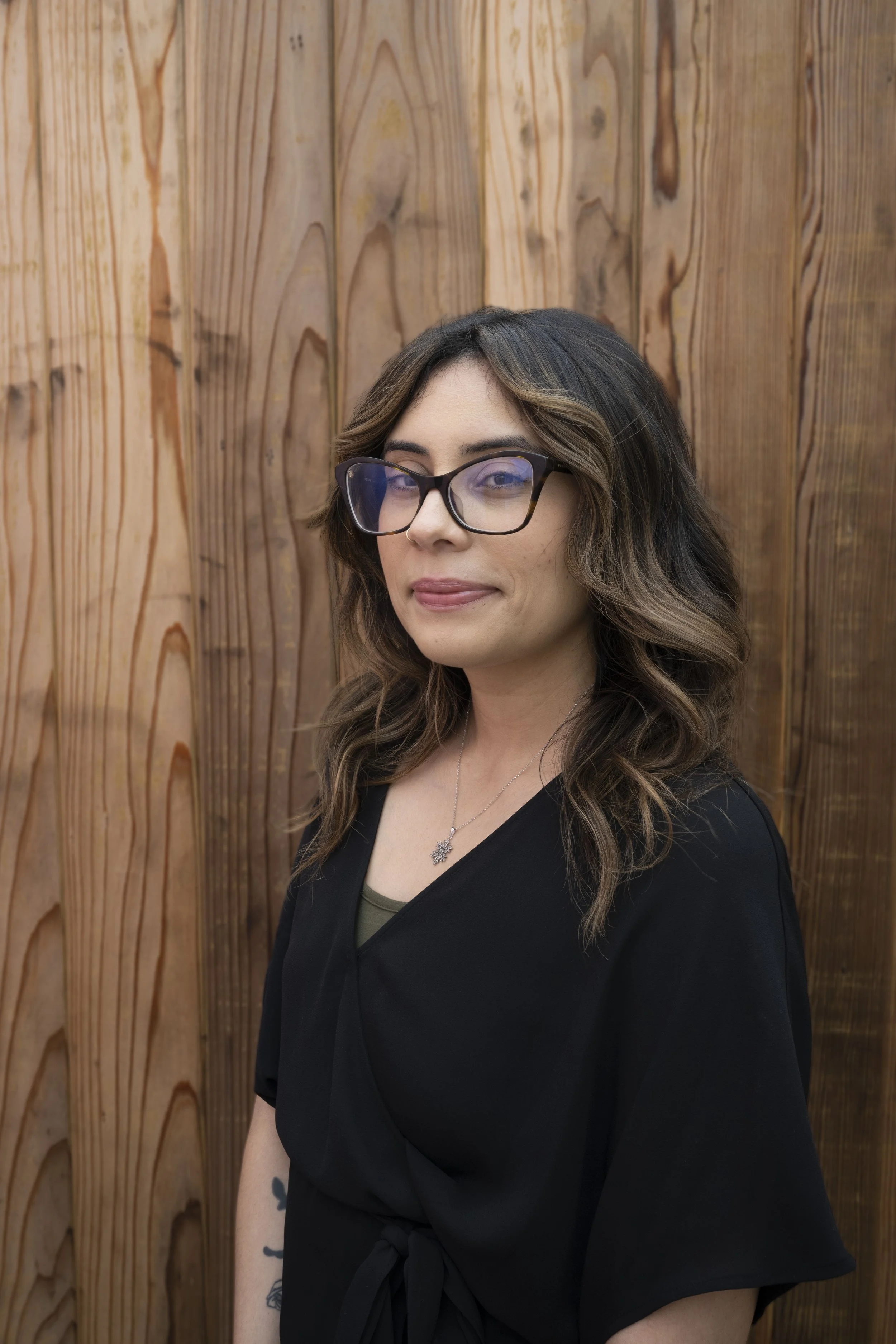When Connection Feels Hard: Navigating Emotional Overwhelm During the Holidays
The Holidays Can Feel Heavy — Here’s How to Care for Yourself When Connection Feels Hard
For many first-generation, BIPOC, and Queer adults, this season can be particularly hard to cope with for these very reasons. As an anxiety therapist Los Angeles, CA, I often see how the holidays can heighten emotional overwhelm — especially for those trying to hold it all together while staying connected to others. Sometimes it is because of unaddressed emotional pain within families, uncertainty about how to navigate expectations of closeness while caring for oneself, or fear falling back into old patterns of behaviors.
October ends, and the holidays seem to hit all at once. There are the Christmas ads on tv, Christmas music in the mall, and a cluster of Christmas themed events on social media. But there is one thing on your mind — and maybe it is dread.
The overwhelmed feeling you tucked away at the start of the new year, sealed in a small box not to re-visit again, begins to resurface.
All it takes is seeing or hearing any semblance of the holidays and those emotions and thoughts come flooding back. Maybe your body even has a knee jerk reaction. There is no escaping it.
There might be some fond memories that bring warmth, too. While parts of the holidays that can feel comforting for some, they can also bring anxiety and disconnection for others — especially when expectations of closeness, family dynamics, and old emotional pain points come into play.
When “Holiday Connection” Doesn’t Feel Safe
Closeness is emphasized during this season as something normal and expected. But what if I tell you it is okay not to feel joyful or find it easy to connect with those you are ‘supposed’ to be with? There are many others who do not see “holiday connection” as safe.
The emotional overwhelm you feel in your body, thoughts, feelings often comes from memories of past experiences shaped by unmet needs, sensory overload, or difficult family dynamics.
Growing up in environments where you had to shrink yourself, silence your needs, or prioritize others’ feelings first can create pressure to be emotionally available, cheerful, and connected even when it’s started to feel heavy to do so. It becomes easy fall back into old patterns of emotional detachment, believing you must handle everything alone because others can’t be trusted to meet your needs.
Anxiety often shows up when we are unable to manage overwhelming emotions or when we fear that our emotional needs will be dismissed or misunderstood.
The sense of dread, you body’s knee jerk reaction, or your thoughts of not wanting to engage — are all signals.
They are reminders that there are parts of this season you are not looking forward to, and that is okay to acknowledge. Even if it feels scary to be with it.
Maybe you have done work in therapy to focus on caring for yourself and now you are worried it might all come apart during the holidays. Or perhaps you are just beginning to take steps towards creating safety for yourself, but you don’t know how — and the holidays are not helping.
Healing isn’t linear—it's a practice of learning to feel seen, safe, and worthy of emotional connection.
It’s also about breaking old cycles and honoring your own emotional needs, setting healthy boundaries, and trusting that emotional intimacy is not only possible but essential for healing.
There are ways to create safety for yourself during these upcoming holidays. As you follow through this blog, prompts will also be provided to help guide your understanding. I work with my clients as an Anxiety Therapist Los Angeles and across California, during the holiday season through bringing awareness, understand their signals, and guide them with practices they can use outside of the room in order to feel empowered. These prompts are just a couple examples of ones we explore in session.
Let’s Identify The Dread — Give yourself 5-10 minutes to pause and reflect
Reflection Question:
When you think about the holidays, what wants to come forward for you? Is it a word, a facial expression, an image, or body reaction?
When did you last experience the same dread? What about this experience is tied to the holidays?
Emotional Overwhelm as a Signal, Not a Failure
There is something about being overwhelmed that can feel familiar and almost normal. First-gen children—now adults—can often recall moments when their parents were overwhelmed from being the primary providers in the home and not knowing how to manage stressors. It becomes so normalized that overwhelm doesn’t feel like a signal to pay attention to, just something you’re supposed to push through.
Many of us grew up with that constant sense of not doing enough, and the restlessness that takes over the moment you sit still for too long.
In reality, overwhelm is your body’s way of saying, “this is too much.” There is something deeper happening underneath responses like shutting down, guilt, or withdrawing when anxiety or stress shows up. The frustration in experiencing anxious thoughts—and not knowing how to make them stop—can be exhausting. Sometimes it even leads to trying to push the anxiety away altogether.
The important thing about paying attention to these experiences is that they often show up in moments of interaction with others. These are the moments you can gently highlight for yourself. Even when we try to store past experiences away in our minds, our bodies remember who or what feels safe and who doesn’t.
These signals can be seen as protective responses in relational moments—early cues letting you know what needs attention.
Once you can identify what overwhelm feels like for you and learn to befriend it becomes easier to explore grounding practices that meet you where you are. This is where the next part of your healing work begins.
The goal is to meet anxiety with curiosity and compassion. The real change begins when anxiety feels safe enough to step back, and that comes from helping yourself understand what it needs.
Identifying Our Overwhelmed Signals — Give yourself 5-10 minutes to pause and reflect
Reflection Question:
Think of an interaction with someone where you felt ‘this is too much'?’
What did you stop yourself from doing to take care of yourself? And what did you do instead?
Finding Grounding in Your Own Capacity
Understanding ourselves helps us recognize our thresholds, needs, and dislikes. Sometimes when we push ourselves beyond our limits, we lose touch with what our true capacity is because we no longer understand our body’s signals. We start to mistake guilt or tension for productivity.
Giving our bodies what they need can feel foreign, especially when growing up didn’t allow for our mind and body to stay connected. Relearning our body cues—and listening to them—helps us identify what capacity we have within the holidays. How long you can stay somewhere. How much time you can spend with loved ones. When you need a break. Whether you can be around people who bring discomfort.
Practicing the skill of identifying your overwhelmed signals and listening to them takes your healing a step further by helping you incorporate grounding practices.
Small Ways to Practice
Naming your emotional limits
Paying attention to body signals that something is too much creates awareness around how long you can stay somewhere, talk to someone, go out, or take something on.Taking sensory breaks
Sometimes the need for a break isn’t triggered by loudness—it can come from too much social interaction, racing thoughts, heavy lighting, or uncomfortable situations.Setting micro-boundaries
Think back to past holiday experiences and what you wish you had done differently to feel more at peace. Notice the limitations you may need this year.Choosing intentional presence over perfection
Step away from the old role of being everything for everyone. Practice being intentionally present within your emotional capacity. Think about what it means to stay connected to yourself without needing to perform or overextend.
Together with my clients as an anxiety therapist in Los Angeles, CA, we explore how they want to rewrite old meanings of emotional connection—especially when those old definitions no longer work and have begun to feel overwhelming. They learn that connection is something we each get to define. Sometimes it’s shared moments with others, and sometimes it’s quiet internal moments of self-regulation.
Rewriting Holiday Connection — Give yourself 5-10 minutes to pause and reflect
Reflection Question:
What grounding tool can you use this holiday season?
Think about what is one small achievable step you can take. The purpose is not to overwhelm yourself, but instead choose one you can implement (ie. one limitation or stepping away to have a breather).
Redefining Connection on Your Terms
Growing up around invisible rules of connection can lead us into expectations we never fully understood. We learn early on that stepping outside those expectations brings guilt or shame. Maybe you’ve tried taking small steps away from what was considered right or correct in your family and were met with anger or misunderstanding. This is a feeling too familiar for many First Gen, BIPOC, and Queer folks.
It can keep you hidden—stuck between wanting to connect in a way that feels good for you, while fearing it will feel hurtful or wrong to others. Cultural and generational pressures can become a heavy burden, leaving you feeling suffocated and without an escape. Choosing yourself can feel selfish or ungrateful. But staying silent and being everything for everyone… is that sustainable for you?
The hard truth? Finding balance is difficult because there will almost always be a reaction around change. It’s human nature to react when things become uncertain. The good news? Their emotional reaction is not a reflection of your worth. Often, the pushback that comes when you assert new boundaries is tied to your family’s struggle to understand what this change means for them and for their relationship with you.
The holidays can make social expectations feel unavoidable and bring a wave of stress about how to show up without becoming emotionally drained. Reflecting on how to create emotional safety or safe connection this holiday season can help you carry that clarity into your friendships, loved ones, dating life, and romantic relationships. When we build a relationship with the anxiety that shows up during the holidays, we open ourselves to new forms of connection without feeling like we’re betraying who we are.
Rewriting Holiday Connection — Give yourself 5-10 minutes to pause and reflect
Reflection Question:
What does connection mean to you today? How has it changed from when you were younger?
Is there space to redefine it this holiday season? and what would it look like?
You Deserve Connection That Feels Safe
Now that you’ve explored your overwhelmed signals, your capacity, and the roots of your connection patterns, it becomes easier to move toward a final layer of healing — learning what emotional safety can look like for you this holiday season.
Emotional safety isn’t something most of us were taught growing up. Many First Gen, BIPOC, and Queer adults grew up learning how to anticipate others’ needs, manage tension in the home, or stay small to avoid conflict.
These behaviors were once there for us when we were younger as a way to cope within our childhood to find some sense of internal peace.
Only because these were strategies you learned young, does not mean there is no room to grow and have different options in how you want to be around others.
It can be learned and practice through small intentional practices. I remind my clients that it is not the big moves you make, but the small intentional practices you begin to use in your daily life to start being in touch with yourself internally and feel more connected. You get to choose what those practices are and how to use them.
A couple of them can look like these:
Taking moments to pause and reflect on what is coming up for you during interactions with others
Choosing to pause in moments of activation, and reflect before responding
Noticing when your signals are showing up
Stepping out when you get activated
Practicing ways of communicating boundaries to see which one sits well for you
Naming your limits (maybe communicating it with whoever you are with as well can help you feel supportive)
Emotional safety allows us to create a higher understaning into our needs, discomfort signals, and be moe intuned. It does not take away anxoety or overwhelm, but it helps you build a sense of self-trust that even if you are entering into the holiday season with dread. You got yourself. You know how to not be controlled by situations that cause you discomfort, and in that — you have more control than what you thought you had.nd with a warm, affirming reflection and a gentle invitation to seek support if connection feels complicated or overwhelming.
As an anxiety therapist Los Angeles, CA, I see every day how powerful it is when my clients learn to honor their needs during the holidays. You deserve connection that doesn’t cost you your peace. You deserve moments that feel gentle, grounding, and aligned with who you are becoming — not who you were expected to be.
Closing Reflection — Give yourself 5–10 minutes to pause and reflect
Reflection Question:
Where can you choose emotional safety for yourself this holiday season, even in the smallest way?
If You’re Needing Support This Holiday Season, You Don’t Have to Navigate It Alone
If this season is bringing up anxiety, overwhelm, or complicated feelings about connection — it’s a sign that something in you is asking for care or wanting to understand where it is coming from. Therapy can offer a gentle, grounding space to explore what’s coming up, understand your emotional patterns, and build the kind of safety you may have never been taught.
As an anxiety therapist in Los Angeles, CA, I support first-generation, BIPOC, and Queer adults who are tired of carrying everything alone and want a more compassionate relationship with themselves and their connections. If you’re curious about what healing could look like for you, I invite you to explore the possibility of working together.
Contact me today for your free consultation at (323) 493-6644 or Book Here.You deserve support that honors who you are, where you come from, and who you’re becoming. Whenever you’re ready, I’m here.





